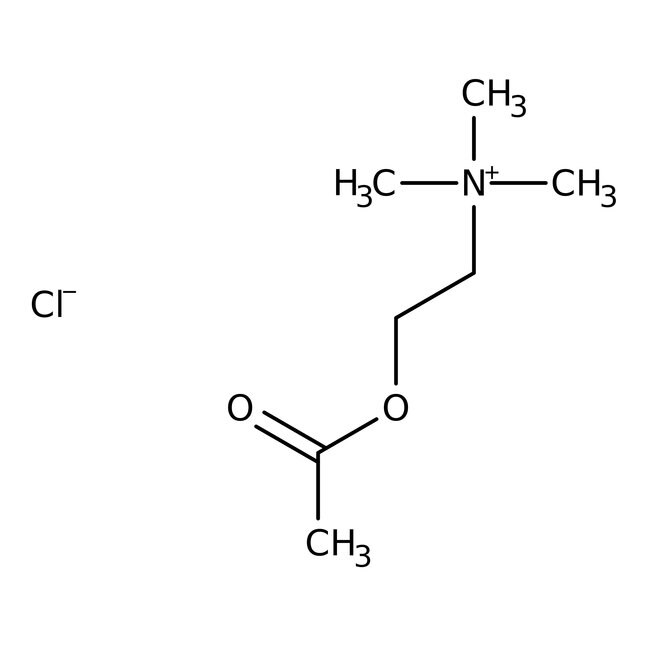Search Thermo Fisher Scientific
Acetylcholinchlorid, 98+ %, Thermo Scientific Chemicals



Acetylcholinchlorid, 98+ %, Thermo Scientific Chemicals
Chemikalien-Kennzeichnungen
Spezifikationen
Beschreibung
This Thermo Scientific Chemicals brand product was originally part of the Alfa Aesar product portfolio. Some documentation and label information may refer to the legacy brand. The original Alfa Aesar product / item code or SKU reference has not changed as a part of the brand transition to Thermo Scientific Chemicals.
Acetylcholinchlorid wirkt bei cholinergen Synapsen als endogener Neurotransmitter. Die Verbindung hat sich als ophthalmologisch erwiesen und kann durch Choliesterasen schnell abgebaut werden. Acetylcholin beeinflusst viele grundlegende Zellfunktionen, wie z. B. Mitose, Zelldifferenzierung, Zytoskelett-Organisation und Zellkontakt und andere Funktionen. Es reduziert Mortalität und proinflammatorische Plasmazytokine bei Mäusen mit experimentell induzierter Sepsis. Der Cholinergicanti-inflamatorische Mechanismus wird wahrscheinlich durch Interaktion von Acetylcholin mit α7n-Cholinorezeptor auf Monozyten, Makrophagen und Neutrophilen vermittelt, wodurch die Konzentration proinflammatorischer Zytokine wie TNF-α, IL-1β und IL-6 verringert wird.
Löslichkeit
Löslich in Wasser (600 g/l bei 20°C), Alkohol, DMSO (36 mg/ml bei 25°C) und Ethanol (36 mg/ml bei 25°C). Unlöslich im Äther.
Hinweise
Von Feuchtigkeit fernhalten. Unter trockenem Inertgas lagern. Nicht kompatibel mit Wärme- und Oxidationsmitteln.
Abbildungen
Dokumente und Downloads
Zertifikate
Häufig gestellte Fragen (FAQ)
Zitierungen und Referenzen
Sicherheit und Handhabung
Classification of the substance or mixture
CLP classification - Regulation(EC) No 1272/2008
Label Elements
Signal Word
Warning
Hazard Statements
H315 - Causes skin irritation
H319 - Causes serious eye irritation
H335 - May cause respiratory irritation
Precautionary Statements
P261 - Avoid breathing dust/fume/gas/mist/vapors/spray
P280 - Wear protective gloves/protective clothing/eye protection/face protection
P302 + P352 - IF ON SKIN: Wash with plenty of soap and water
P305 + P351 + P338 - IF IN EYES: Rinse cautiously with water for several minutes. Remove contact lenses, if present and easy to do. Continue rinsing